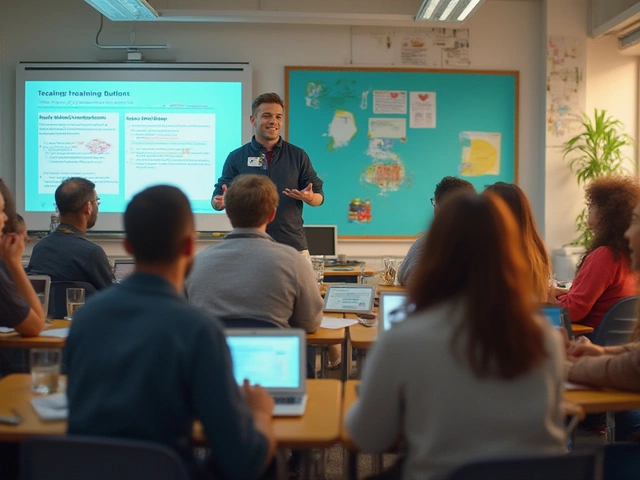When we think about education, we often picture bustling classrooms filled with young faces. Yet, adult learning is an equally vital part of the educational landscape, playing a crucial role in personal and professional growth. Adult learning, in its essence, revolves around the concept of lifelong learning — the idea that one should continuously pursue knowledge and skills throughout life.
Unlike traditional learning, adult education is usually more self-directed and driven by the learner's personal goals or professional needs. It acknowledges that adults bring a wealth of experience to their learning journey and that their education should be meaningful, relevant, and directly applicable to their daily lives.
- Defining Adult Learning
- Characteristics of Adult Learners
- The Importance of Motivation
- Practical Application
- Flexible Learning Paths
- Tips for Successful Adult Learning
Defining Adult Learning
The concept of adult learning is not just about enrolling in a night class or taking an online course. It's a comprehensive approach that recognizes how adults learn differently from children and teenagers. As adults, we have accumulated a diversified bank of experiences that deeply influences how we perceive new information. This dynamic background means that adult education must meet distinct needs, employing methods that facilitate understanding and retention by building on what we already know.
Adult learning is often rooted in practicality and immediate application. Adults are typically more motivated to learn when they see a clear benefit in relation to their personal or professional goals. This drive for knowledge can lead to highly enriching educational experiences, but it requires an approach that values learners' autonomy and agency. For adult learners, being active participants in their learning process rather than passive recipients is crucial. Statistics show that adults retain knowledge more effectively through active engagement rather than rote memorization.
Understanding the principles behind adult learning is essential. Malcolm Knowles, often referred to as the father of adult education, highlighted several assumptions about adult learners. Among these, he emphasized that adults are self-directed and expect to take responsibility for decisions. This explains why traditional top-down teaching methods are usually less effective for adults. Knowles's concept of andragogy—the art and science of helping adults learn—suggests learning environments be structured to foster active exploration and reflection, catering to adults' readiness to learn and their orientation towards learning.
“Adults have rich experiences that are a critical resource in their learning. We must embrace these experiences and design learning strategies that allow adults to build on what they already know.” — Malcolm KnowlesThis quote beautifully captures the essence of engagement in adult education. Research continues to support such learning strategies. A recent survey indicated that 75% of adults preferred educational experiences that allowed them to draw on their prior experiences.
Moreover, skills development is a huge aspect of adult learning. Many adults return to education to enhance their skills for better career prospects or to transition into new fields. These motivations are reflected in the growing trend of micro-learning and credentialling systems and platforms that allow adults to learn at their own pace and convenience. Certification programs, workshops, and short courses are incredibly popular because they fit into the busy lives of adult learners, who often juggle multiple responsibilities.
Creating a positive learning environment is fundamental to the success of adult education. Effective programs incorporate real-life scenarios and collaborative learning activities that resonate with adult learners. Learning is not a solo journey—peer interactions and community support play significant roles in adult learning contexts. This blend of approaches not only enhances understanding but also considerably boosts engagement and motivation, turning education into a rewarding endeavor rather than a daunting task.
Characteristics of Adult Learners
Adult learners are a fascinating group with distinct strengths and needs that set them apart from their younger counterparts. One of the most remarkable characteristics is their goal-oriented nature. Adults engaging in education usually have clear purposes driving them, such as career advancement, personal fulfillment, or the necessity to acquire new skills due to a changing job market. This goal focus often leads to high motivation levels, as learning is directly tied to their personal or professional lives. This is a crucial aspect for educators to consider because tapping into an adult's existing motivation can lead to more effective learning outcomes.
Another key trait is the wealth of experience adult learners bring to the table. This experience isn't just from previous education but spans personal life, career endeavors, and diverse social interactions. Such experiences can serve as rich resources during learning, prompting educators to incorporate real-world examples and practical applications into their teaching strategies. Adult learners often prefer learning methods that connect directly to their past experiences as these approaches tend to make learning more grounded and meaningful. Reflecting on their own experiences helps them relate new knowledge to existing frameworks, fostering deeper understanding.
A noteworthy aspect of adult learning is the preference for self-direction. Adults typically want to have control over their learning choices, allowing them the freedom to set personal learning goals, choose resources, and pace their study. Autonomy in learning helps adults feel responsible for their educational progress, increasing engagement and the internal motivation needed for successful learning. This does not mean they work entirely alone; rather, they appreciate a learning environment that offers guidance while still respecting their independence.
“Adults resist learning under conditions that maximize their insecurity and helplessness. They too need their learning to make sense, to be meaningful, relevant, and useful to them in their work and personal lives.” – Malcolm S. Knowles, the father of andragogy
Finally, adult learners generally show a need for immediacy in the way they apply their learning. Unlike traditional students, who often learn concepts to use in future scenarios, adults prefer tangible results from their studies that they can put into place immediately in their own lives or within their jobs. Training programs and courses that provide direct links between content and practical outcomes often resonate more effectively with adult learners. Providing learners with the tools and skills they need to address real-world challenges they currently face can significantly increase their learning engagement.
In understanding these characteristics, educators and program designers can better craft experiences that resonate with this unique demographic. Offering learning strategies that leverage adults’ experiences, respect their autonomy, and provide practical and relevant content can enrich the educational journey and prove highly successful in developing lifelong learning habits.

The Importance of Motivation
Motivation is a powerful driving force in adult learning. Unlike children, adults have specific reasons behind pursuing education, often deeply intertwined with career aspirations, personal growth, or the desire to achieve a particular skill. This intrinsic motivation is crucial because it directly influences the success of the learning process. Adults are more likely to engage, persevere, and succeed in their educational endeavors when they are motivated by clear goals. According to a study by the National Center for Education Statistics, about 73% of adult learners cite career advancement as a primary motivator for further education.
Understanding motivation is key to creating effective learning strategies. Adults need to see the relevance of what they are studying; if they can connect the material to real-life applications, their engagement increases significantly. For instance, a marketing professional learning data analytics might directly apply new insights to improve campaign performance, which makes the learning process more rewarding and impactful. When adults perceive the outcomes as immediately beneficial, their commitment to the learning path strengthens, promoting a self-reinforcing cycle of development and achievement.
"Motivation is what gets you started. Habit is what keeps you going." - Jim Ryun
Moreover, the social environment also plays a role in influencing an adult’s motivation. Interaction with peers, instructors, and mentors can serve as a source of motivation. Being part of a learning community provides moral support and encourages the sharing of ideas and experiences, enhancing the overall educational experience. Unlike traditional education, where grades often serve as motivators, adult education thrives on collaboration and community support, which instill a sense of belonging and accomplishment.
Creating an environment that fosters motivation in lifelong learning involves recognizing and addressing these motivational elements. Instructional design in adult education often incorporates elements like problem-solving tasks, case studies, and real-world projects to keep motivation levels high. For educators, understanding these dynamics is crucial; it allows them to tailor teaching methods that align with adult learners' motivations, ultimately making the learning experience more personalized and impactful.
Finally, self-motivation remains a central pillar of adult learning. As learners set personal targets and milestones, achieving these gives them a sense of accomplishment, which fuels further motivation. Adults often juggle multiple responsibilities, so recognizing achievements not only boosts their confidence but also solidifies their commitment to continue learning. Tools like goal-setting frameworks and reflective practices are valuable in helping learners stay motivated, providing checkpoints that celebrate progress and ignite the desire to reach even greater heights.
Practical Application
Adult learning shines when it's intertwined with real-world applications. This isn't about abstract theories floating in textbooks, but rather knowledge that can be grasped and used. Adult learners, more than anyone, crave the tangible link between what they learn and its practicality in daily life. This makes the teaching method, which often includes case studies, role-playing, and project-based learning, not just more engaging, but incredibly effective.
Consider a scenario where a manager is learning new skills to become more adept at handling workplace conflicts. Instead of reading about conflict resolution strategies, they might participate in simulations where they can practice and receive feedback. This hands-on approach not only solidifies understanding but also builds confidence to tackle similar situations in the future. It's about turning learning into a tool that can be wielded immediately.
Skills development is another area where practical application comes into play vividly. For example, consider someone in the tech industry learning a new programming language. Classroom knowledge is essential, yet the true learning happens when they start developing applications or collaborating on projects. This not only enhances their learning curve but also prepares them for the unexpected hiccups that occur in any real software environment.
"Tell me and I forget, teach me and I may remember, involve me and I learn." - Benjamin Franklin
Moreover, practical application is often about shifting the center of learning from the instructor to the adult learner themselves. By engaging with materials, practicing self-reflection, and applying lessons in ever-changing contexts, adults become the architects of their own learning journey. This is vital because adults, unlike younger learners, often deal with multi-faceted responsibilities and roles, balancing their education with careers, families, and community obligations. Understanding and integrating their learning with these aspects of their lives can dramatically increase engagement and retention.
Interestingly, a survey conducted by the National Institute for Adult Learning found that 72% of adults are more likely to continue their education if they see direct benefits in their everyday lives. When the learned concepts have obvious applications, enthusiasm naturally follows, and inertia in learning fades away. Imagine a small business owner learning digital marketing skills to boost their online presence. With each concept and strategy applied, they witness an unprecedented growth in their business, which in turn fuels their desire to learn more.
In essence, practical application weaves the theoretical with reality, allowing adults to not just learn but transform their lives. By focusing on the utility of knowledge, adult education empowers learners to reinvent themselves continually, adapting to the ever-shifting landscapes of their personal and professional worlds.

Flexible Learning Paths
One of the appealing aspects of adult learning is its ability to mold itself to the varied needs of learners. Unlike the rigid schedules of traditional schooling, flexible learning paths offer adults a myriad of choices. This approach recognizes that adults juggle multiple responsibilities — from work to family — making it often impossible to adhere to the fixed times demanded by conventional education. Flexible paths make learning achievable without compromising existing commitments and provide a diverse range of options to accommodate different learning styles and paces. From online courses to evening classes and weekend workshops, the availability of learning platforms has increased immensely over the past decade, giving adults the necessary tools to embark on an educational journey that fits seamlessly into their lives.
One significant development in the realm of adult education is the rise of Massive Open Online Courses (MOOCs), which allow learners from around the globe to gain knowledge from prestigious universities without having to step foot on campus. This not only makes education more accessible but also democratizes it, providing opportunities to millions who would not have access otherwise. According to Coursera, one of the leading MOOC providers, over 100 million learners have participated in courses offered on their platform since its inception. The flexibility of online learning platforms means that adults can learn at their own pace and revisit materials as needed, ensuring they fully absorb and understand the content.
Notably, many learning institutions now offer modular courses that are specifically designed for part-time study. This approach allows lifelong learners to focus on specific modules that interest them or are directly applicable to their career needs. Such flexibility is crucial for adults who may only need a particular skill set or knowledge area to advance in their careers. Additionally, modular courses often allow credits to be transferred, meaning learners can accumulate them over time and eventually earn a degree if desired. This system is brilliant because it does not pressure learners into completing a degree in a fixed period. Instead, it encourages them to learn continuously, achieving their educational goals at a pace that suits their life.
Flexible learning also champions the idea of micro-credentials and badges. These are short, focused educational experiences that recognize specific skills or competencies. They are increasingly valuable in the modern workplace, where the emphasis is on practical skills over generic qualifications. According to a report by the World Economic Forum, over 50% of all employees will require significant re-skilling by 2025, highlighting the need for adaptable and accessible learning solutions. Through these smaller learning units, adults can demonstrate their abilities and learn new ones without committing to long-term academic programs, providing a pragmatic solution to the ever-changing demands of today's job market.
Some educational experts emphasize that the need for flexible learning is paramount. As educational visionary Sir Ken Robinson once said,
“We need to rethink the fundamental principles on which we're educating our children and adults.”This notion extends to the structure and delivery of adult learning programs. Modern educational environments need to continually innovate and adapt to remain meaningful in a rapidly evolving world.
Tips for Successful Adult Learning
Embarking on the journey of adult learning can be both exciting and daunting. Adults learn differently than children; understanding these differences can significantly enhance the learning process. One crucial tip is to set clear, achievable goals. By identifying what you wish to accomplish, you establish a roadmap for your educational journey. This clarity helps you stay focused and motivated, especially when juggling multiple responsibilities like work and family. It's also helpful to regularly review these goals to track your progress and adjust your plans as needed.
Engagement is another cornerstone of successful adult education. Adults thrive in environments where their experiences are valued. This appreciation can be fostered through interactive learning sessions where learners can share insights and relate them to real-world scenarios.
Malcolm Knowles, a pioneer in adult learning theory, emphasized, 'Adults are motivated to learn as they experience needs and interests that learning will satisfy.'His theory suggests that relevance is key, so always seek learning opportunities that connect directly to your personal or professional life.
Creating a conducive environment for lifelong learning is essential. This means finding or creating a space where you can focus without distractions and organizing a schedule that accommodates learning amid other commitments. Using technology to your advantage can simplify this process. Online courses, podcasts, and webinars provide the flexibility needed to fit learning into a busy schedule. Many resources are available at varying levels of cost, from free MOOCs to specialized platforms tailored to specific industries.
Another important tip for skills development is to embrace feedback and opportunities for self-reflection. Adult learners benefit greatly from constructive criticism, which helps refine skills and deepen understanding. Creating a habit of self-assessment encourages critical thinking and self-improvement. Consider maintaining a learning journal where you reflect on your experiences, challenges, and successes. This practice promotes a deeper engagement with the material and leads to more meaningful learning experiences.
Social learning shouldn't be overlooked. Joining study groups or communities of practice can enrich your learning adventures. Sharing knowledge with peers not only reinforces your own understanding but also builds a network of support and encouragement. These groups foster collaboration, allowing you to learn from others' experiences and perspectives, which can be particularly beneficial when tackling complex or unfamiliar topics.
Lastly, never underestimate the power of intrinsic motivation. Passion and curiosity are potent drivers of adult learning. When you're genuinely interested in the subject matter, the process of acquiring new knowledge becomes less of a chore and more of an enjoyable journey. To maintain enthusiasm, celebrate small milestones along the way. Reward yourself for meeting goals and acknowledge your progress, no matter how small. This positive reinforcement fuels continued learning and skill development, paving the way for long-term educational success.






